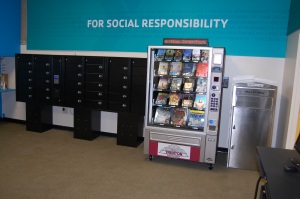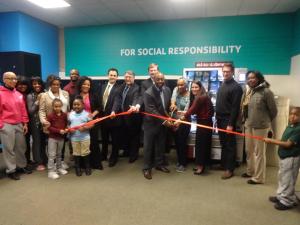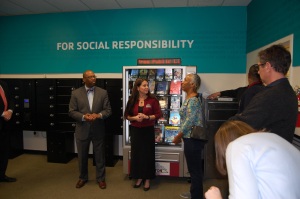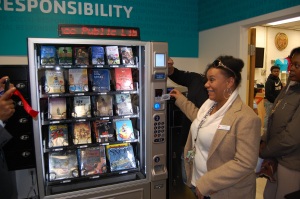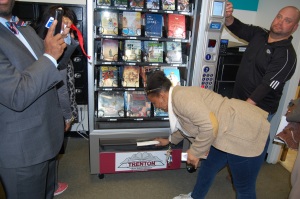I have to play solitaire to go to sleep.
I didn’t use to. I would watch tv, read, dozing and drifting to quiet my mind. And eventually I would drift off.
But that doesn’t work anymore. My mind races. To-Do lists fill my head. Conversations rehashed or practiced. Strategies and plans. Budgets and contracts. They barrage my mind until I’m making notes into the wee hours. Sending emails. Making lists.
Why? What has changed?
My job.
I started as a librarian. Moved on to management. And then into administration. I always thought that jump from management to administration would simply be a natural progression of steadily increasing responsibility and challenges. But I simply had no idea. Being the Director (if you are in an autonomous agency and doing the job correctly) is to be the CEO of your library.
But they don’t teach you to be a CEO in library school. I also have an MBA. And surprise. They teach you a whole lot about money, marketing and business. But they don’t teach you to be a CEO in Business School either
So when you find yourself in the job and realize that none of your formal education has given you the tools necessary to do the job, what do you do? As any good librarian, I started researching. I found hundreds of books, articles, and online resources on the subjects; because IN FACT they don’t teach you to be a CEO anywhere.
So how do you learn to be a CEO?
After asking a great many professionals and doing a great deal of research I have come to the conclusion that the majority all learn the same way. They get dropped in the deep end of the pool and either drown or swim.
And what does it mean to be the CEO of a Library? What does the job look like? How is it similar or different than being the CEO of other types of organizations?
So what do my days as the CEO of an urban public library look like…?
Many of my days take on a life of their own and a trajectory that on great days I shape, on good days I wrangle, and on bad days I just hang on and pray a little.
I simplify life. I tell people when they have done well or when they have failed. I refocus energies on the goal. I remind people of the path. I listen and summarize in the hopes that my synopsis might provide the clarity for others to reach a decision
Other times I complicate life. I explain what is missing and request more to be done. I explain why a project is not complete though it is presented as such. I add necessary details or new information that reshapes a project. I add new requirements I only now realize are necessary because of the progress made thus far.
In some people’s story I am the champion. In others the villain. And none, if any, know the whole story even when they believe it is their own. I take blame and give credit. I have broad shoulders and thick skin to withstand the barrage when it will shield the innocent and ensure the goals are accomplished.
I make sure that everyday I am exactly the kind of employee I want to have. I work harder, longer and better than I expect anyone else to do. I don’t ask anyone to do anything that I would refuse to do or have not done in the past. I model every attitude and every behavior I ask my staff to have. I hold myself to a higher standard than I would anyone else. I create the culture of my organization. I build my team. With that team, I define the vision and set the direction of my organization.
I never raise my voice. I admit when I’m wrong. I ask for, listen to, and implement better ideas than my own. I try to surround myself with people who are smarter and better than me. This makes some staff love me.
I am decisive. I know my own mind and my vision for my organization. I believe we can be better. So I do not accept the present as good enough. I tell people when they are wrong and demand they do better. This makes some staff dislike me.
And at the end of the day if the organization is better I have succeeded. If it is worse I have failed.
And at the end of the day- I am responsible for everyone and everything.
Because that’s what being a CEO is. And that’s why they don’t teach it in any school or classroom. Because they can’t. It’s not a job or a profession. It’s not even a career.
It’s a way of life.
My job is to hop and juggle and prioritize. Like a circus performer, keeping all my plates spinning on their sticks. And just when they start to fall, give them a good spin in the right direction with all my focus and attention for a split second before I move to another set of plates and do the same. And repeat. And repeat. And repeat.
When does it stop? When does it get easier?
Never.
Why does it matter you may ask? Why do we need to understand that a Library Director is a CEO? Defining the position helps us identify the skills, education, and measures of success for the job.
How do we gauge the success of a Library Director? How their staff feels, patron feedback, increased material circulation? We know the CEO of a corporation is successful based on the companies bottom line and growth. How do we determine the success of a Public Library and therefore its Director? In a Library there is no fiscal bottom line, instead we use numbers that are more fluid, testimonials of patrons, budget ups and downs, etc. So how do Boards and Citizens evaluate the work of their Director? Do they? Shouldn’t they?
And if we are going to start using clear criteria to determine the success of our Library CEOs, are we providing them with the skills necessary to BE good at the job? Or are we simply taking good Librarians and promoting them hoping they will also be good administrators? We are overflowing with leadership programs in LibraryLand – but is growing leaders the same as training skilled CEO’s to lead our Libraries?
This year the 21st Century blog is going to spend time exploring the issue of Library Director as CEO. This incudes: training, tools, skills, challenges, measures, outcomes, and more. I hope you’ll contribute to this important conversation.


